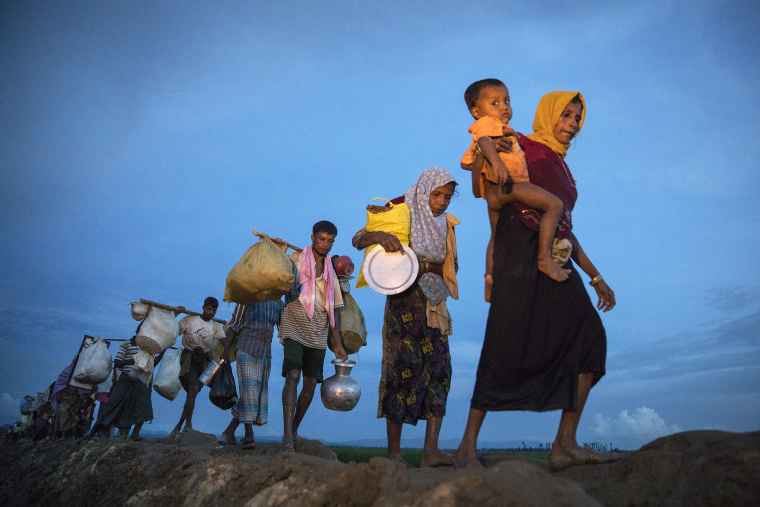Myanmar's military coup Monday is a case of the chickens coming home to roost.
After more than half a century of military rule beginning in 1962, one can argue that the decade of tentative democracy in Myanmar that ended this week was an aberration. But it didn't have to be the case if international actors had put pressure on the military to change its behavior and had helped draft a proper constitution that enshrined the rights of all its citizens when the country finally adopted democracy in 2010.
Despite the obvious inhumaneness of this constitutional classification, the international community took few steps to try to change the document or its application.
Instead, the military, while no longer officially ruling the country, was allowed to retain its power and grow its influence. Most significantly, in 2017, it launched an ethnic cleansing operation in the western state of Rakhine that led to the exodus of the Rohingya minority. This travesty was both a direct sign of the failures of the constitution and a warning to the international community that it had to act if Myanmar was to stay a democracy. But the international community did little other than condemn the violence.
The weaknesses in the Myanmar constitution were clear even when it was ratified in 2008. It allowed the military to take power during a "state of emergency." In addition, a quarter of the parliamentary seats were reserved for the military, including the key ministries of defense and foreign affairs. Most important, the document didn't guarantee that all people living in the country were eligible for citizenship.
Following a colonial legacy, the Myanmar constitution of 2008 has an official classification system of "135 national races," based on assumptions of who the original inhabitants of the territory before colonial rule were. It created categories of national status, which allowed the mostly Muslim Rohingya minority to be disenfranchised and ultimately expelled. Now they are largely a stateless community living in refugee camps in neighboring Bangladesh.
Despite the obvious inhumaneness of this constitutional classification, the international community took few steps to try to change the document or its application. That emboldened the military to invoke the "state of emergency" clause to remove the elected National League for Democracy, or NLD, from office and put its leader, Aung San Suu Kyi, under detention.
As justification, the military cited voter fraud in the November elections, the victors of which were to have been seated this week. Although there were, indeed, irregularities in the fall elections — because ethnic minority populations couldn't vote in several areas — in places where polls took place, Suu Kyi's party did win an overwhelming mandate from the people to continue running the country. The military's citing of voter fraud probably had to do more with its desire to end civilian control of the government.
Yet the NLD shares blame for its plight. Over the years, the military has actively tried to re-establish credibility among the country's Bamar Buddhist majority after decades of authoritarian rule and oppression. Suu Kyi, also eager to secure her status running the country once democracy took hold, supported the military in its persecution of the Rohingya, thereby gaining support from the overwhelming Buddhist majority.
Even after the U.N. and other international fact-finding bodies showed that ethnic cleansing and even genocide might have occurred in the violent episodes of summer 2017, Suu Kyi still went to the International Court of Justice at the Hague to defend the army. This only helped secure its position among the Myanmar's Buddhist population and encourage it to take even bolder steps. With the facts obtained by international bodies, global powers should have pressed Suu Kyi more about her defense of the army and perhaps threatened to cut back diplomatic ties.
Several times over the past few years, to crush dissent among ethnic minorities, the military also resorted to internet blackouts. Once again, the international community did little to push back and help minority groups find ways to work around this shutdown. So now we see the military again implementing the tactic to counter any dissent in the main cities.
The U.N. considers the internet to be an essential mechanism for people to exercise the right to free information. For several months, restrictions were placed in Rakhine and Chin sates by the Myanmar establishment to limit access to information before the coming elections. Back then, it was regarded as the world's longest-running internet blackout.
During this time, the international community should have questioned the electoral process, because without the free flow of information, elections couldn't be free and fair. However, this election cycle coincided with the U.S. elections, and observers were more focused on that.
For quite some time, scholars and activists have been ringing alarm bells for the international community about events in Myanmar. Panic signals were sent for several years before the ethnic cleansing of the Rohingya in 2017— but no one cared.
Even in 2017, the international community remained largely silent about the persecution. Will this coup be the best wake-up call for the international community? Perhaps, as the U.S., the U.K., and European Union have all expressed their distress about Monday's events.
The new Biden administration should impose more sanctions on Myanmar, directed at this time towards the nation's military, because that is the main barrier to democracy in the country. More important, along with other international actors, it should push for a constitution that guarantees free speech and citizenship for all residents.
Hopefully, it isn't too late to bring democracy back to Myanmar.



